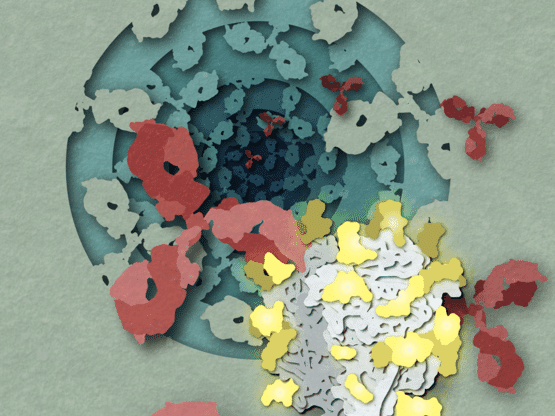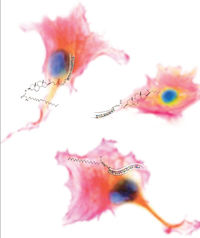How neuronal activity leads to Alzheimer's protein cleavage
Amyloid precursor protein (APP), whose cleavage product, amyloid-b (Ab), builds up into fibrous plaques in the brains of Alzheimer's disease patients, jumps from one specialized membrane microdomain to another to be cleaved, report Sakurai et al.
Although there is no definitive evidence that Ab plaques are the direct cause of Alzheimer's disease, there is much circumstantial evidence to support this. And working on this hypothesis, scientists are investigating just how the plaques form and what might be done to stop or reverse their formation.
APP, a protein of unknown function, is membrane associated and concentrates at the neuronal synapse. Certain factors such as high cellular cholesterol and increased neuronal or synaptic activity are known to drive APP cleavage, and Sakurai and colleagues' paper pulls these two modes of Ab regulation together.
APP associates with membrane microdomains high in cholesterols (lipid rafts). These lipid rafts can also contain the enzyme necessary for APP cleavage, BACE. Synaptic activity is known to involve a very different type of membrane microdomain high in an excytosis-promoting factor called syntaxin. Sakurai et al. now show that although APP preferentially associates with syntaxin microdomains, upon neuronal stimulation APP instead associates with microdomains that contain BACE.
It's unclear why APP should be associated with syntaxin, though it might suggest a role for APP in vesicle trafficking and exocytosis. Also unclear is why neuronal activity should cause APP to jump from syntaxin domains to BACE domains. What is clear, however, is that the process is an active one, requiring a kinase called cdk5. Furthermore, treating neurons with a cdk5 inhibitor called roscovitine, which is currently in trials for cancer treatment, reduced APP's association with BACE microdomains and reduced APP cleavage.
Original publication: Sakurai, T., et al.; J. Cell Biol. 2008.
Organizations
Other news from the department science

Get the life science industry in your inbox
By submitting this form you agree that LUMITOS AG will send you the newsletter(s) selected above by email. Your data will not be passed on to third parties. Your data will be stored and processed in accordance with our data protection regulations. LUMITOS may contact you by email for the purpose of advertising or market and opinion surveys. You can revoke your consent at any time without giving reasons to LUMITOS AG, Ernst-Augustin-Str. 2, 12489 Berlin, Germany or by e-mail at revoke@lumitos.com with effect for the future. In addition, each email contains a link to unsubscribe from the corresponding newsletter.
More news from our other portals
Last viewed contents





















































